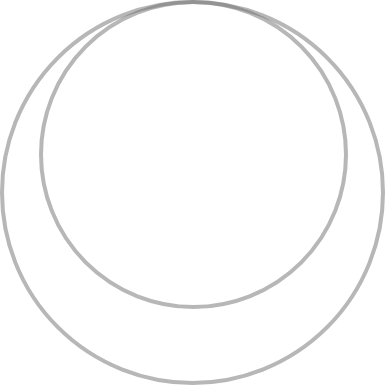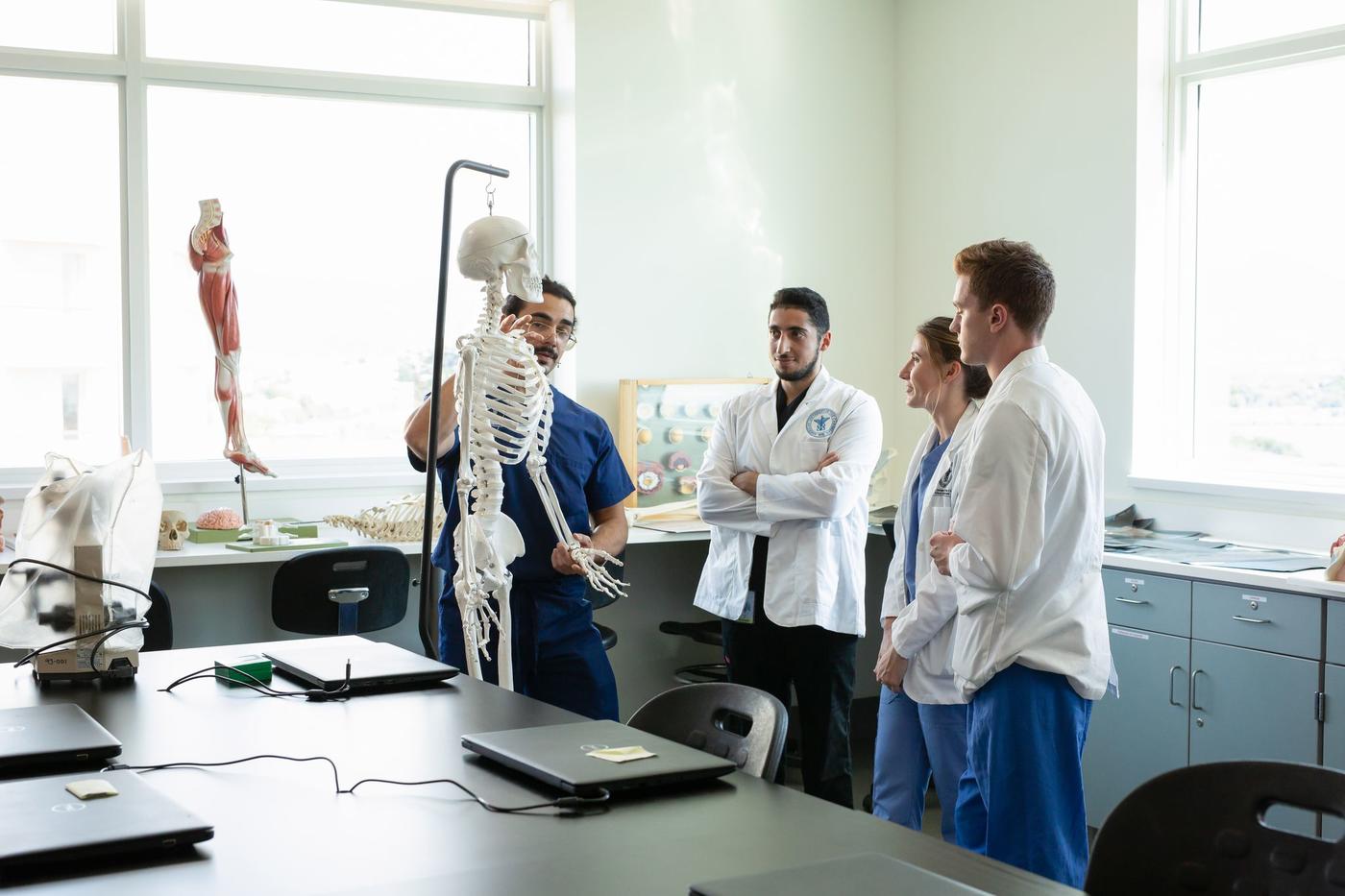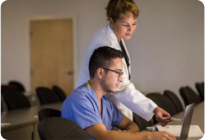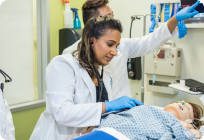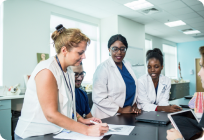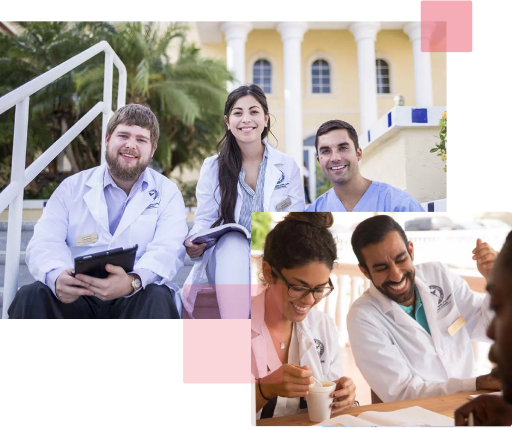Our Curriculum
You’ll participate in clinical care scenarios in our simulation center, where you will use cues given by high-fidelity simulated patients to develop clinical reasoning, learn how to approach diagnosis, and practice working on a patient care team.
You’ll also learn how to take a patient’s history and perform a physical exam while working with standardized patients. Long before you enter clinical training at a teaching hospital, you will learn how to apply your medical sciences knowledge to patient care.
Upon completion of the medical sciences curriculum, students are required to take and pass the United States Medical Licensing Exam® (USMLE®) Step 1 before proceeding on to the clinical sciences portion of the program for their clinical rotations.
YEAR 1-2
Integrated Organ Systems-Based Curriculum
Molecules to Medicine
20 Credit Hours
The Molecules to Medicine module will provide students with a current understanding of the intimate interplay between molecular structures and functions, intracellular molecular systems, and human pathologies using a systemic approach. As the introductory module in the Medical Sciences curriculum, Molecules to Medicine provides a reliable multidisciplinary source of knowledge that will serve as the fundamental base to current concepts in medicine. Content is provided using evidence-based cases to facilitate critical-thinking and problem-solving skills. Communication, collaborative teamwork, and the development of skills in systems-based practice are introduced early and practiced with the intention of improving patient outcomes. Students will be able to demonstrate knowledge about the established and evolving core of basic medical sciences, apply knowledge of basic medical sciences to patient care, and develop investigatory and critical thinking approaches.
Hematology, Oncology, Attack and Defense
10 Credit Hours
The Hematology, Oncology, Attack and Defense module provides a comprehensive and in-depth study of normal and abnormal blood physiology, hematological oncology, pharmacology, histology and embryology, pathology, immunology, and microbiology. Clinical aspects of anemia, leukemia, lymphoma, bleeding disorders, immunologic disorders, and neoplasms are considered. Various clinical abnormalities of blood and immune systems are discussed. In addition to these topics, aspects of pharmacology, imaging, public health, psychosocial aspects of illness, ethics, and health care transformation are presented. This module continues the application of problem-solving and analytical thinking skills to clinically integrated problems in basic medical science.
Musculoskeletal and Skin
10 Credit Hours
Musculoskeletal and Dermatology module aims to examine the organ systems of the skin and the musculoskeletal structures. The students will develop theoretical and clinical skills via lectures, online learning, and clinical workshops to develop in depth knowledge of concepts and clinical skills in the musculoskeletal and dermatology fields. Clinical medicine will foster the development of objective, data-driven evaluation skills in the evaluation of scientific and clinical data especially in the medical literature and case studies in the field of musculoskeletal and dermatology fields.
Cardiovascular
10 Credit Hours
The Cardiovascular module will provide students with a detailed understanding of the cardiovascular system that integrates knowledge from scientific disciplines and clinical medicine. Development of skills in use and interpretation of clinical investigative techniques and critical and analytical thinking skills in the evaluation of scientific and clinical information as applied to diagnosis of cardiovascular disorders are essential aspects of the module.
Respiratory and Renal
10 Credit Hours
The Respiratory and Renal module will provide students with a detailed understanding of the respiratory and renal systems that integrates knowledge from scientific disciplines and clinical medicine. Development of skills in use and interpretation of clinical investigative techniques and critical and analytical thinking skills in the evaluation of scientific and clinical information as applied to diagnosis of respiratory and renal disorders are essential aspects of the module.
Gastrointestinal and Nutrition
10 Credit Hours
The Gastroenterology-Nutrition module will discuss and integrate the normal anatomy, embryology, histology, and physiology of the gastrointestinal system and the role of nutrition in human health. The normal functioning of the GI system will be compared to pathologies at the molecular, biochemical, cellular, tissue, and whole-organ levels. An evidence-based and patient-centered approach will be applied to the teaching of how to manage and maintain a healthy gastrointestinal system.
Endocrine and Reproductive
10 Credit Hours
The Endocrine and Reproductive module will concentrate teaching on normal and abnormal male/female reproduction and normal and abnormal endocrine function. A multidisciplinary approach including embryology, anatomy, histology, physiology, pharmacology and pathology will establish the core medical knowledge required for these organ systems. Module concepts will include normal and abnormal endocrine function and disease states produced from pathologic conditions of the adrenal, thyroid, parathyroid, pancreas, liver, hypothalamus and pituitary glands, adipose tissue, and the reproductive organs. As the basic foundational knowledge is established the clinical medicine component of the module will integrate all aspects of the science and art of medicine. The subject matter will also cover public health, ethics, and social disparities and effects on endocrine and reproductive health.
Brain and Behavior
10 Credits Hours
The Brain and Behavior module will integrate and discuss the normal and abnormal anatomy, embryology, histology, and physiology of the central and peripheral nervous system. The etiology and process of development for these systems will be included. The nervous system's functional and behavioral expression will be covered from molecular, biochemical, anatomical, genetic, psychological, psychiatric, psychosocial, geographic, and cultural perspectives. This will be applied in the evidence-based and patient-centered processes of assessing and diagnosing various neurological and psychiatric disorders.
Clinical Reasoning
10 Credits Hours
The Clinical Reasoning Course serves as a comprehensive review to the medical sciences curriculum. Students are expected to demonstrate competency at clinical skills using a multistation Objective Structured Clinical Examinations. This module also focuses on the final preparation for USMLE Step 1.
Learning Enhancement Course 101 (1 Credit Hour)
Learning Enhancement Course 201 (5 Credit Hours)
Learning Enhancement Course 202 (5 Credit Hours)
Learning Enhancement Course 301 (5 Credit Hours)
Learning Enhancement Course 302 (5 Credit Hours)
Learning Enhancement Course 401 (5 Credit Hours)
Learning Enhancement Course 402 (5 Credit Hours)
Learning Enhancement Course 501 (5 Credit Hours)
Learning Enhancement Course 502 (5 Credit Hours)
Independent Community Engagement Elective 630 (1 Credit Hour)
Independent Community Engagement Elective 631 (1 Credit Hour)
Independent Community Engagement Elective 632 (1 Credit Hour)
Independent Research Elective 601 (1 Credit Hour)
Independent Research Elective 602 (2 Credit Hours)
Independent Research Elective 603 (3 Credit Hours)
Disaster Medicine Elective (1 Credit Hour)
Service Learning Elective 620 (1 Credit Hour)
Service Learning Elective 621 (1 Credit Hour)
Service Learning Elective 622 (1 Credit Hour)
Medical Sciences Capstone Elective (10 Credit Hours)
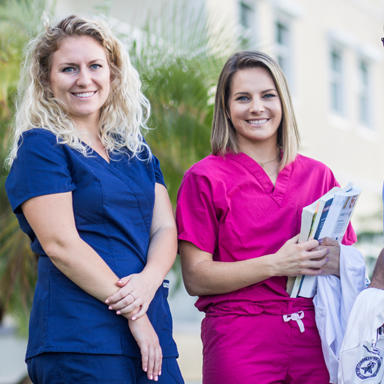
Apply to AUC Today
Take your next step to become the doctor you’ve always dreamed of. It’s easy with AUC by your side supporting you along the way.

